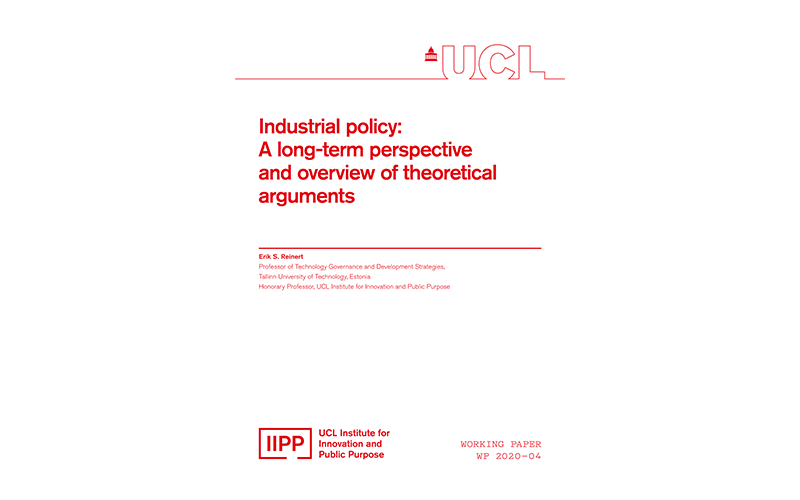Industrial policy: A long-term perspective and overview of theoretical arguments

17 June 2020
UCL Institute for Innovation and Public Purpose (IIPP) Working Paper Series: IIPP WP 2020-04
Author
- Erik S. Reinert | Professor of Technology Governance and Development Strategies, Tallinn University of Technology, Estonia and Honorary Professor, UCL Institute for Innovation and Public Purpose
Reference
Reinert, E.S. (2020). Industrial policy: A long-term perspective and overview of theoretical arguments. UCL Institute for Innovation and Public Purpose, Working Paper Series (IIPP WP 2020-04). Available at: https://www.ucl.ac.uk/bartlett/public-purpose/wp2020-04
Abstract
This is a brief overview of the historical arguments that have been used to argue for industrial policy in its widest sense, i.e. that what a nation (or region) specializes in producing may be of key importance to the wealth and welfare of its inhabitants. Historically it has been generally agreed that symmetrical trade – trade in similar goods between nations at similar levels of technological developments – has tended to be beneficial to both trading partners. In these cases, employing Ricardian trade theory has not been detrimental to the trading partners. This paper explains the situations when Ricardian trade theory is not beneficial to one of the trading partners or – at the same time – the economic mechanisms which have been identified as making industrial policy desirable.
That manufacturing matters has, in various forms, been presented as a main reason for industrial policy at least since England’s ‘import substitution’ policies during the 1400s, which saw value added to English wool by spinning it into woollen cloth and garments. This was mainly achieved by raising export duties on raw wool, making English wool cheaper for domestic manufacturers than for foreign ones. However, the reasons why manufacturing matters have varied: understanding has gone from intuitive inferences to scientific evidence. This paper will present the history of this process and the most common arguments for industrial policy over time.
 Close
Close

